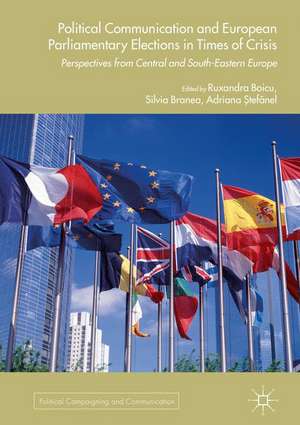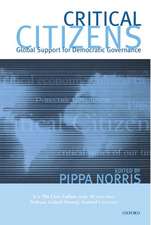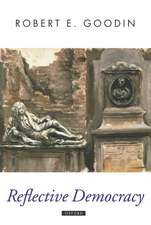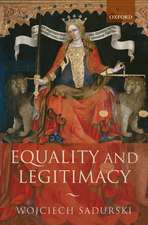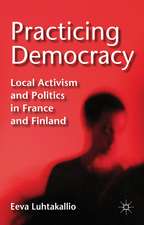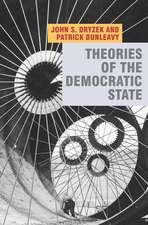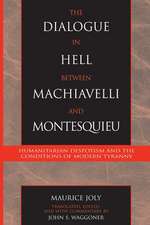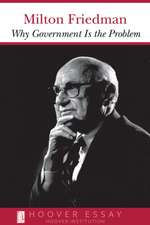Political Communication and European Parliamentary Elections in Times of Crisis: Perspectives from Central and South-Eastern Europe: Political Campaigning and Communication
Editat de Ruxandra Boicu, Silvia Branea, Adriana Stefanelen Limba Engleză Hardback – 6 ian 2017
Din seria Political Campaigning and Communication
-
 Preț: 152.45 lei
Preț: 152.45 lei - 20%
 Preț: 690.35 lei
Preț: 690.35 lei -
 Preț: 353.61 lei
Preț: 353.61 lei - 15%
 Preț: 695.85 lei
Preț: 695.85 lei - 18%
 Preț: 890.37 lei
Preț: 890.37 lei - 15%
 Preț: 643.65 lei
Preț: 643.65 lei - 15%
 Preț: 586.23 lei
Preț: 586.23 lei - 18%
 Preț: 785.42 lei
Preț: 785.42 lei -
 Preț: 415.52 lei
Preț: 415.52 lei - 18%
 Preț: 780.19 lei
Preț: 780.19 lei - 18%
 Preț: 724.50 lei
Preț: 724.50 lei -
 Preț: 382.57 lei
Preț: 382.57 lei - 18%
 Preț: 890.23 lei
Preț: 890.23 lei - 18%
 Preț: 726.85 lei
Preț: 726.85 lei - 18%
 Preț: 895.58 lei
Preț: 895.58 lei - 18%
 Preț: 725.43 lei
Preț: 725.43 lei -
 Preț: 390.63 lei
Preț: 390.63 lei
Preț: 729.84 lei
Preț vechi: 890.05 lei
-18% Nou
Puncte Express: 1095
Preț estimativ în valută:
139.66€ • 146.18$ • 116.24£
139.66€ • 146.18$ • 116.24£
Carte tipărită la comandă
Livrare economică 31 martie-14 aprilie
Preluare comenzi: 021 569.72.76
Specificații
ISBN-13: 9781137585905
ISBN-10: 1137585900
Pagini: 305
Ilustrații: XXII, 291 p.
Dimensiuni: 148 x 210 x 22 mm
Greutate: 0.51 kg
Ediția:1st ed. 2017
Editura: Palgrave Macmillan UK
Colecția Palgrave Macmillan
Seria Political Campaigning and Communication
Locul publicării:London, United Kingdom
ISBN-10: 1137585900
Pagini: 305
Ilustrații: XXII, 291 p.
Dimensiuni: 148 x 210 x 22 mm
Greutate: 0.51 kg
Ediția:1st ed. 2017
Editura: Palgrave Macmillan UK
Colecția Palgrave Macmillan
Seria Political Campaigning and Communication
Locul publicării:London, United Kingdom
Cuprins
Tables.-Foreword; Claes de Vreese.- Introduction: ”Proposal of a Framework for the 2014 European Parliament Elections and Campaigns in Central and Eastern Europe”; Silvia Branea and Ruxandra Boicu- Part I: Media Coverage and Political Marketing.- (1) Political Advertising in Polish European Parliament Election Campaign; Agnieszka Stępińska.- (2) Media rhetoric and virtual communication in Bulgaria; Ivanka Mavrodieva.- (3) Intermedia Agenda-Setting during the 2014 EP Elections in Poland; Bartlomiej Lodzki and Anna Paluch.- (4) An Overshadowed Campaign in two Croatian Dailies; Gordana Vilović.- (5) Perspectives on the Romanian Electoral Context and Media Coverage of Campaign Discourses; Adriana Ștefănel.- (6) Coverage of the 2014 European Parliamentary Electoral Campaign in Romania’s Print Press (A Case Study); Ruxandra Boicu.- Part II: A Second-order Campaign?.- (7) A Second-order Campaign in Lithuania?; Ingrida Unikaitė-Jakuntavičienė.- (8) Content emptiness, low media coverage, exhausted parties and indifferent voters: an invisible 2014 European Parliamentary election campaign in the Czech Republic; Jakub Charvat.- (9) Outline of women candidates in Romania’s EP elections; Silvia Branea.- Part III: European vs. National Agenda.- (10) The EU agenda as an emerging cleavage of political competition? Parties and their voters in Slovakia; Olga Gyarfasova.- (11) European and national agendas in the 2014 EP elections in Hungary; Boglárka Koller.- (12) Reflection of citizens’ agenda in the European Parliament Election in the Czech Republic; Ilona Švihlíková.- (13) Looking behind the scenes of the electoral panel discussion organized by the Czech independent think-tanks; Kryštof Kruliš.- Part IV: Ideological premises, candidates‘ recruitment, vote results.- ctoral Strategiesl; Marzena Cichosz.- (15) Results of the European Parliament Elections in Poland; Robert Alberski(16) Patterns of Recruitment of Polish Candidates in the 2014 European Parliament Elections; Dariusz Skrzypiński.- (17) Election Results, candidate lists, and the framing of campaigns in the Czech Republic; Otto Eibl and Michal Pink.- (18) Czech Eurosceptic Parties in the European Parliament; Petr Just- Index.
Recenzii
“This collection of essays offers unique snapshots of national contests within nations facing challenges for the embedding of democracy. … The rich coverage and insightful data within the essays raise particularly important questions for consideration for the study of the future of democracy in Europe. Hence this work represents a must read for scholars and practitioners in this important field of human endeavour and the book a timely and welcome contribution to the Palgrave Political Communication and Campaigning series.” (Darren G. Lilleker, Medijske Studije, Vol. 7 (14), 2016)
Notă biografică
Ruxandra Boicu is Associate Professor at the Faculty of Journalism and Communication Studies, University of Bucharest, Romania, where she is Head of the MA on Media and Communication. She has authored Dezbaterea electorală televizată [The Televised Electoral Debate] (2011) and other books and scholarly articles on political discourse, gender studies, verbal interaction in blogging, and diasporic media.
Silvia Branea is Associate Professor at the Faculty of Journalism and Communication Studies, University of Bucharest, Romania. Her research interests include political communication, gender studies, and globalization. She has participated in prestigious international projects and is the author/co-author of several books and articles, including “Romanian Journalists and Politics in 2004”.
Adriana Ștefănel is Associate Professor at the Faculty of Journalism and Communication Studies, University of Bucharest, Romania. She won a postdoctoral scholarship in 2015 from University of Bucharest Research Institute to conduct research on populism and political discourse. She is the author of When the Stranger Become the Enemy: The Image of the Est-Europeans in Western-Europe Political Discourse (2014).
Silvia Branea is Associate Professor at the Faculty of Journalism and Communication Studies, University of Bucharest, Romania. Her research interests include political communication, gender studies, and globalization. She has participated in prestigious international projects and is the author/co-author of several books and articles, including “Romanian Journalists and Politics in 2004”.
Adriana Ștefănel is Associate Professor at the Faculty of Journalism and Communication Studies, University of Bucharest, Romania. She won a postdoctoral scholarship in 2015 from University of Bucharest Research Institute to conduct research on populism and political discourse. She is the author of When the Stranger Become the Enemy: The Image of the Est-Europeans in Western-Europe Political Discourse (2014).
Textul de pe ultima copertă
This book tackles the 2014 European Parliamentary election as an event, phenomenon and process from an interdisciplinary but coherent perspective. This edited volume includes research by prestigious academics from the former communist countries in question, all of which have only recently become EU members. The contributors consider whether there is a crisis of Euroscepticism, or, for that matter, extremism of any kind in each country discussed. In doing so, the volume seeks to analyse the future of the European Union itself. It will appeal to scholars and graduate students interested in elections and voting behaviour, comparative European politics, and political communication.
Caracteristici
Uniquely approaches European parliamentary elections exclusively within the geopolitical space of the former communist countries that have recently become EU members Provides a comparative understanding of major topics related to elections, voting behaviour, media coverage and political communication Features contributions from respected scholars who cover 8 different countries
